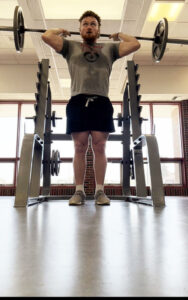By J.D. EDDY, Editorial Editor

Sports can serve as an outlet to help relieve people of depression, anxiety, stress and any sort of image problems.
When I say sports, I’m not just talking about school sports. It can be kickboxing, wrestling, Zumba, yoga, powerlifting, bodybuilding and basically anything that helps you express who you are.
When I was in high school, sports were always in my life. I played football and baseball, and I wrestled and ran track. Being that active meant I always had my mind on other things.
I focused on football my senior year. I used it as an outlet for things that were happening in my life, while also trying to secure an athletic scholarship for college. I’m sure most athletes dream of this when they are playing a sport in high school. It is an attainable goal if you work for it.
Now I am sure not everyone plays sports because they are angry or depressed, but these conditions can be a factor in how good you are at that activity.
Any activity where you hit something is cathartic, meaning it relieves stress and provides some sort of satisfaction. When I was in boxing or kickboxing, being able to hit something provided a sense of relief.
Sometimes, I hold in emotions and do not let them out until I do some form of exercise to release them.
Any form of exercise can relieve stress, but according to researchers with Harvard Health Publishing, exercising can relieve some of the feelings of a guilty conscience. I partially agree with this, but exercise is not the only thing a person needs to alleviate a guilty conscience. For example: if I hit somebody else’s car with my car, the first thing I am not going to do is exercise.
The thing that works for most men (I do not have a view on the female perspective) is being motivated by trauma in our lives. When a man gets his heart broken, you notice that he turns into a different person: cold-hearted, more driven, smarter and more physically fit.
I’ve said it before: Exercise does more for you after a traumatic event than almost everything.
According to the website for the Anxiety and Depression Association of America: “The physical benefits of exercise, improving physical condition and fighting disease have long been established. Physicians always encourage staying physically active.”
This is true. The NFL use to air a commercial that promoted exercising for 60 minutes a day. It did not matter what form of exercise you did. What mattered was that you were getting out for that amount of time.
According to researchers with the University of Vermont, “Overall, schools that implemented the programs had better health and fitness profiles than schools that chose not choose to implement them or only did so partially.”
The university’s website shows that schools that did not participate in this did not see improvement in students’ mental health, and saw little to no improvement in physical health.
That is kind of off topic. This was to show that exercise can improve your levels of happiness, self-image, self-confidence and can change the path of your life for the better.
I am not saying exercise will completely get rid of all negative feelings. Northwestern offers counseling services on campus. More information about these was included in an email sent out by the school last Thursday.
If you are feeling distressed and think exercise is the way to go,
I say go for it. But keep in mind that you have to develop exercise into a habit for it to be effective. At least that’s how it was for me.
I have talked about exercise being an important part of physical health before, but the mental side is really what you need to focus on.
We all have ways to deal with trauma in our life; this is mine. It is only a suggestion. Whatever you feel is best for you and helps you deal with it, that’s what matters the most.


